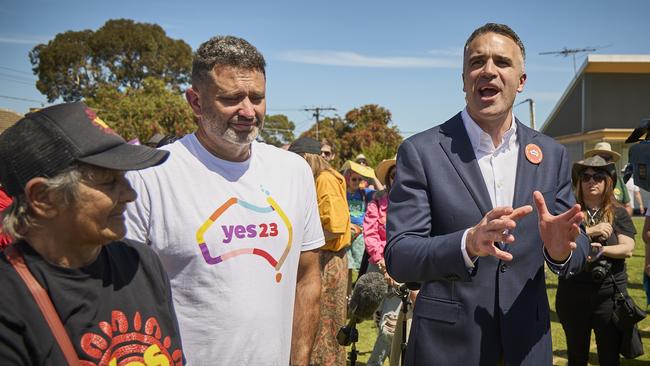Pressing on with SA Voice is height of arrogance | Caleb Bond
This is the Premier at his most arrogant – pressing on with the SA Voice when the state emphatically rejected it, writes Caleb Bond.
Opinion
Don't miss out on the headlines from Opinion. Followed categories will be added to My News.
Pressing on with a state-based Voice to Parliament is the height of arrogance.
South Australia overwhelmingly rejected the federal proposal – 64.8 per cent voted No.
That was the second-highest No vote in the country, behind Queensland. Not a single South Australian electorate returned a majority Yes vote.
Have Premier Peter Malinauskas and Attorney-General Kyam Maher not considered that this result may have something to do with the fact SA is the only state to have legislated its own Voice to Parliament?
Excluding the long reign of Sir Thomas Playford, SA is a fundamentally Labor state. The ALP has been in power for 34 of the past 50 years.
But that is not because it’s filled with lefties – SA is very much in the mould of old Labor.
Adelaide doesn’t have quite the same level of inner-city leftist elitism as other capitals.
And as has been evidenced by the nationwide referendum results, Labor electorates in the suburbs – full of migrants and normal, working-to-middle-class people – voted No.
I have no doubt SA’s strong rejection was tied to the fact it already had a taste of the Voice.
But Mr Malinauskas says there’s nothing to worry about in his version and it is entirely different to the federal model.
“This will be a non-binding advisory committee – it’s not enshrined in the constitution, it’s established through legislation,” he said after the referendum failed.
Sure, it’s not in the constitution. It could be repealed by a future government and it protects against legal challenges.

But look at the powers to be vested in the state Voice.
It will consist of two people to whom a bunch of smaller local voices will report.
These two people will be able to address parliament on any Bill they choose. This could range from planning laws to abortion.
They will also be able to provide reports to parliament on “matters of interest” – anything it wants – to which the government will be compelled to provide a response outlining what it is doing about the matter in question.
While Mr Malinauskas may imply that South Australians rejected a constitutionally-enshrined Voice to Parliament, they also rejected the principle of a Voice entirely.
Whichever way you slice it, SA’s Voice will confer special privileges on Indigenous people.
If any other ordinary citizen or lobby group writes to their MP or a minister, they are not guaranteed a response by legislation.
No one else has the unfettered right to address parliament on any Bill they choose.
That is part of why people – and South Australians in particular – rejected a federal voice.
We don’t want special rights. We want equal rights for all.
Any Aboriginal Affairs minister worth their salt ought to be able to consult with remote communities as a matter of course. They are paid to be across the brief – not to farm it out to a legislated advisory body.
Given the resounding result in SA, continuing with this race-based body is a middle finger to the will of the people.
Legislated or constitutionally enshrined, it is not wanted.




